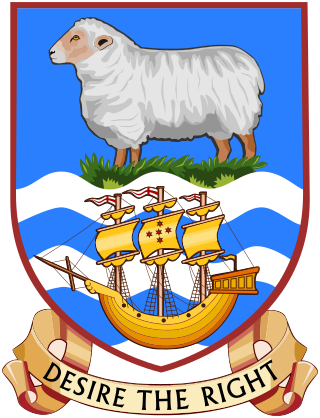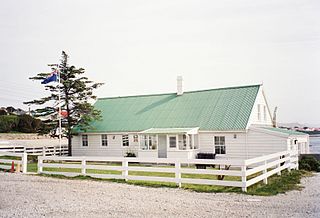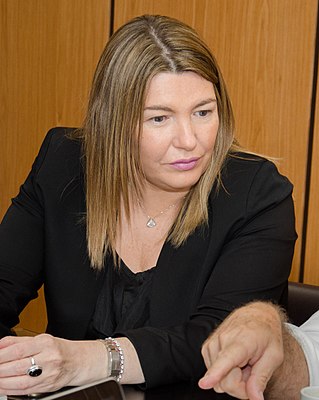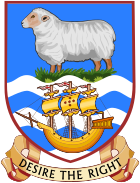
The politics of the Falkland Islands takes place in a framework of a constitutional monarchy and parliamentary representative democratic dependency as set out by the constitution, whereby the Governor exercises the duties of head of state in the absence of the monarch, and the Chief Executive is the head of the Civil Service, with an elected Legislative Assembly to propose new laws, national policy, approve finance and hold the executive to account.

Stanley is the capital city of the Falkland Islands. It is located on the island of East Falkland, on a north-facing slope in one of the wettest parts of the islands. At the 2016 census, the city had a population of 2,460. The entire population of the Falkland Islands was 3,398 on Census Day - 9 October 2016.

The governor of the Falkland Islands is the representative of the British Crown in the Falkland Islands, acting "in His Majesty's name and on His Majesty's behalf" as the islands' de facto head of state in the absence of the British monarch. The role and powers of the governor are set out in Chapter II of the Falkland Islands Constitution. The governor in office resides at Government House, which serves as the official residence.

The Legislative Assembly of the Falkland Islands is the unicameral legislature of the British Overseas Territory of the Falkland Islands. The Legislative Assembly replaced the Legislative Council when the new Constitution of the Falklands came into force in 2009 and laid out the composition, powers and procedures of the islands' legislature.

The following outline is provided as an overview of and topical guide to the Falkland Islands:

The speaker of the Legislative Assembly is the presiding officer of the Legislative Assembly of the Falkland Islands. The speaker also administers the oaths of office and allegiance.

The Legislative Council of the Falkland Islands was the unicameral legislature of the Falkland Islands from 13 November 1845 until 1 January 2009. The new constitution came into force in 2009 and replaced the Legislative Council with the Legislative Assembly of the Falkland Islands.

The Falkland Islands Constitution is a predominantly codified constitution documented primarily within the Falkland Islands Constitution Order 2008, a statutory instrument of the United Kingdom. The constitution, in its present form, was made on 5 November 2008 by Queen Elizabeth II in a meeting of the Privy Council at Buckingham Palace. It was laid before Parliament on 12 November 2008 and came into force on 1 January 2009, replacing the 1985 constitution.

The Falkland Islands general election of 2009 was held on Thursday 5 November 2009 to elect members to the Legislative Assembly. It was the first general election in the Falkland Islands since the new constitution came into force on 1 January 2009, which replaced the old Legislative Council with the Legislative Assembly. Chief Executive Tim Thorogood acted as Returning Officer.

Michael Victor Summers is a Falkland Islands politician who served as a Member of the Legislative Assembly for the Stanley constituency from 2011 to 2017. He was previously a Member of the Legislative Council from 1996–2009.

The Falkland Islands general election of 2001 was held on Thursday 22 November 2001 to elect members to the Legislative Council through universal suffrage using block voting. Chief Executive Michael Blanch acted as Chief Counting Officer.

The Falkland Islands general election of 2013 was held on Thursday 7 November 2013 to elect all eight members of the Legislative Assembly through universal suffrage using block voting, with each Stanley constituent having up to 5 votes and each Camp constituent having up to 3 votes. A total of 1,046 ballots were cast in Stanley, representing a turn-out of 75.4%, and 242 ballots in Camp, representing a turn-out of 85.5%. As no political parties are active in the Falklands, all the candidates stood as Independents. The Chief Executive of the Falkland Islands, Keith Padgett, acted as returning officer. It was the second election since the new Constitution came into force replacing the Legislative Council with the Legislative Assembly.

The Falkland Islands general election of 1956 was held in March and April 1956 to elect members to the Legislative Council. Four out of the twelve Councillors were elected through universal suffrage, two from Stanley and one each from East Falkland and West Falkland. Owing to the remoteness of some settlements and the unpredictability of the weather on the Falkland Islands, the election took place over several days.

The Falkland Islands general election of 1964 was held on 16 and 17 March 1964 to elect members to the Legislative Council. Four out of the ten Councillors were elected through universal suffrage, two from Stanley and one each from East Falkland and West Falkland. It was the first election in the Falklands after the number of Councillors was reduced from twelve to ten, with the abolition two appointed members of the Council. Marjorie Vinson became the first woman to be elected to the Council, winning the seat of East Falkland.

The Falkland Islands general election of 1976 was held in 1976 to elect members to the Legislative Council. Four out of the ten Councillors were elected through universal suffrage, two from Stanley and one each from East Falkland and West Falkland. The election was delayed twice, first in November 1975 when the dissolution of the Legislative Council was postponed by ten weeks to 31 January 1976 and then again in January 1976 when it was postponed to 28 February 1976. This was done in the hope that the election would be held under the proposed new constitution and to allow the Falkland Islanders opportunity to study the report of the Select Committee before the election took place. In reality, the new constitution did not come into force until the following year, with the first election under the new constitution taking place in October 1977, just 15 months after the last election.

The Falkland Islands general election of 1977 was held on Thursday 6 October 1977 to elect members to the Legislative Council. Six Councillors were elected through universal suffrage, one from each constituency.

The Falkland Islands general election of 1985 was held on Thursday 3 October 1985 to elect members to the Legislative Council. Eight Councillors were elected through universal suffrage using block voting, four from each constituency.

Rosana Andrea Bertone is an Argentine politician and the former Governor of Tierra del Fuego Province, serving from 2015 to 2019. Since 2019 she has been a National Deputy.

A referendum on reforming the electoral system was held in the Falkland Islands on 24 September 2020, after being postponed from 26 March 2020 following the Coronavirus pandemic. Voters were asked if they wanted to replace the two existing electoral constituencies with a single constituency for the whole of the Islands. Although a majority of those who voted supported the change, the required two-thirds majority in both of the islands' constituencies was not achieved.







